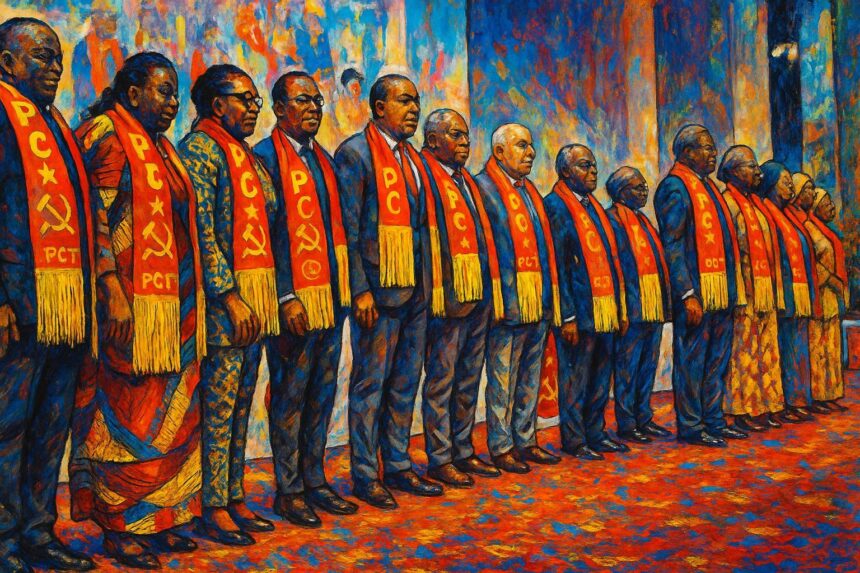Preparatory Committee Sets the Tone
Few political gatherings in Brazzaville attract as much attention among diplomatic observers as the ordinary congresses of the Congolese Labour Party, the pillar of the Congolese presidential majority since 1979. In the vaulted hall of the Palais des Congrès, Secretary-General Pierre Moussa opened the preparatory works for the sixth congress on 7 August, flanked by senior cadres and coalition partners. His address, broadcast live by Radio Congo and relayed by the daily “Les Dépêches de Brazzaville”, framed the forthcoming conclave as a moment of “high political intensity” that must distil a refreshed vision while safeguarding the party’s historical continuity (Radio Congo, 7 August).
Moussa’s rhetoric resonates with a tradition inside the PCT where congresses serve as barometers of elite cohesion. By invoking a “collective dynamic of reflection, consultation and action”, he signalled an inclusive approach, a nuance that seasoned diplomats read as reassurance that factional contestations will be managed within institutional channels rather than in public view.
Fiscal Discipline through Special Levy
Beyond choreography, the secretary-general unveiled a special membership levy to underwrite logistical expenses. The measure reprises a model tested during the 2011 and 2019 extraordinary sessions, when internal financing insulated the party from external scrutiny over campaign funding (Jeune Afrique, archive July 2019). By labelling the contribution “an act of militancy”, Moussa linked fiscal compliance with ideological fidelity—a narrative calibrated to strengthen grass-roots cohesion at a time of global economic headwinds and domestic budgetary restraint.
Local section heads contacted by the Agence d’Information d’Afrique Centrale report an upbeat mobilisation, particularly among youth and women’s unions eager to showcase “financial patriotism”. Still, the preparatory committee quietly acknowledges that uneven purchasing power across departments obliges a differentiated quota; discreet solidarity transfers from Brazzaville and Pointe-Noire are expected to smooth regional disparities.
Strategic Timetable before 2026
While the electoral calendar remains constitutionally distant, Moussa’s insistence that the congress must lay the groundwork for a “resounding victory” in 2026 drew immediate notice among chancelleries. The formulation neither named an official standard-bearer nor pre-empted internal debate, yet seasoned insiders interpret the pledge as a de facto commitment to continuity in executive leadership. In that sense, the congress acts less as a forum for personnel turnover than as a mechanism to align provincial networks behind a unified message.
Analysts at the Marien Ngouabi University’s Centre for Political Studies highlight that the PCT historically leverages congress resolutions to crystallise programmatic themes—from infrastructural modernisation to agricultural revival—that subsequently guide governmental blueprints. Embedding electoral strategy within a congress dossier therefore streamlines coherence between party doctrine and state policy, a feature often praised by regional partners for enhancing predictability.
Regional and International Context
The party’s introspection unfolds against a turbulent sub-regional backdrop. Coups in the Sahel and fluctuating hydrocarbon prices have complicated the policy environment for Central African states. By urging militants to show “lucidity and audacity” in confronting economic and climate challenges, Moussa implicitly acknowledged external pressures without conceding narrative control. Foreign diplomats interviewed in Brazzaville perceive this stance as an attempt to project steadiness and invite investment confidence, especially as Congo-Brazzaville positions itself as a reliable oil and timber supplier amid rerouted global supply chains.
On the multilateral front, the government’s endorsement of the African Continental Free Trade Area has opened avenues for industrial diversification. Observers expect the congress to enshrine commitments to value-added processing, facilitating a synergy between party platforms and the administration’s National Development Plan 2022-2026. The preparatory committee’s thematic commissions, now being formed, will likely summon experts from ECCAS and UN agencies to refine drafts, mirroring the technocratic ethos that has become a hallmark of current governance.
Diplomatic Takeaways
For diplomatic missions accredited in Brazzaville, the rehearsal underway in the PCT offers an early reading of policy continuity and elite discipline. The emphasis on self-financing and mass consultation signals confidence in domestic legitimacy mechanisms, reducing exposure to foreign funding critiques. At the same time, the scheduled congress provides a structured forum for adjustments that international partners often advocate, notably in environmental governance and youth employment.
Should the preparatory phase proceed without visible schisms, the sixth ordinary congress will likely reaffirm the PCT’s entrenched position in Congo-Brazzaville’s political architecture. For envoys seeking policy stability, the message is clear: institutional rhythms remain intact, strategic priorities are being refreshed rather than overhauled, and the road to 2026 is being paved with the familiar mix of organisational discipline and rhetoric of popular sovereignty.





















